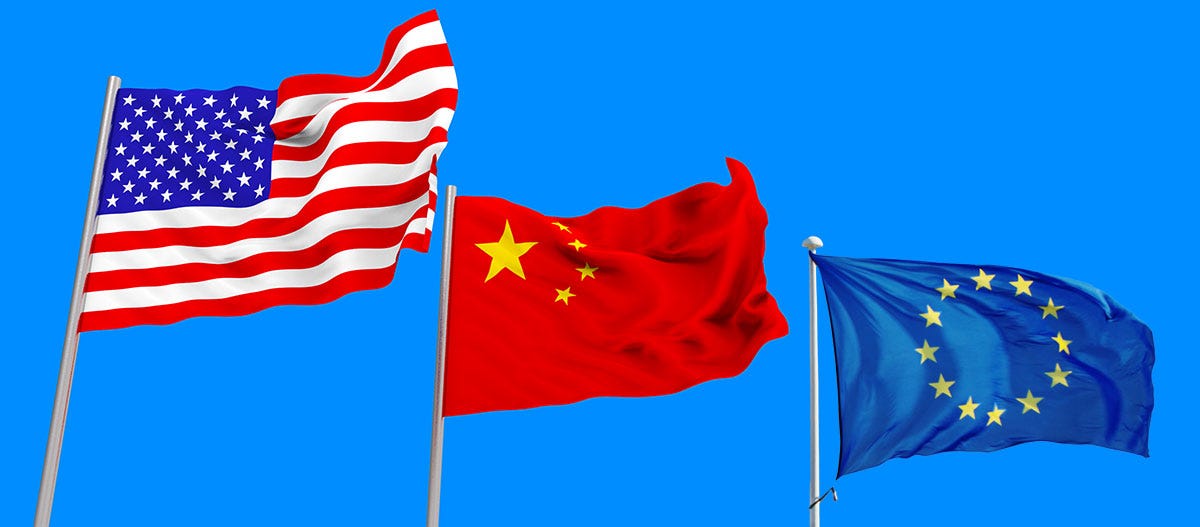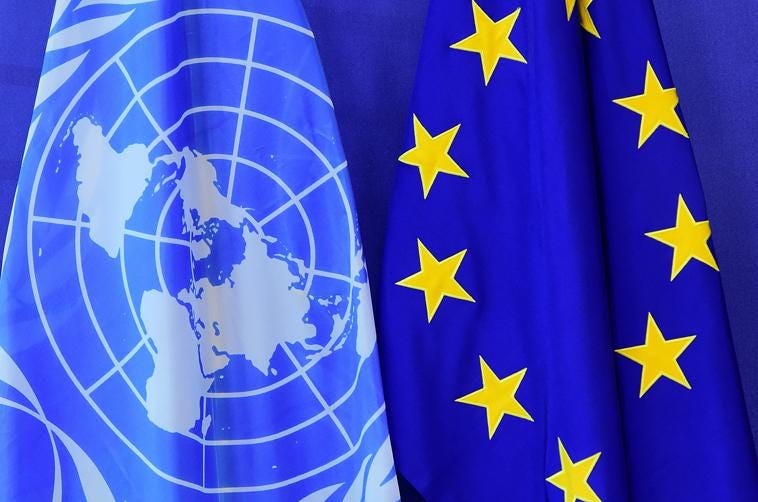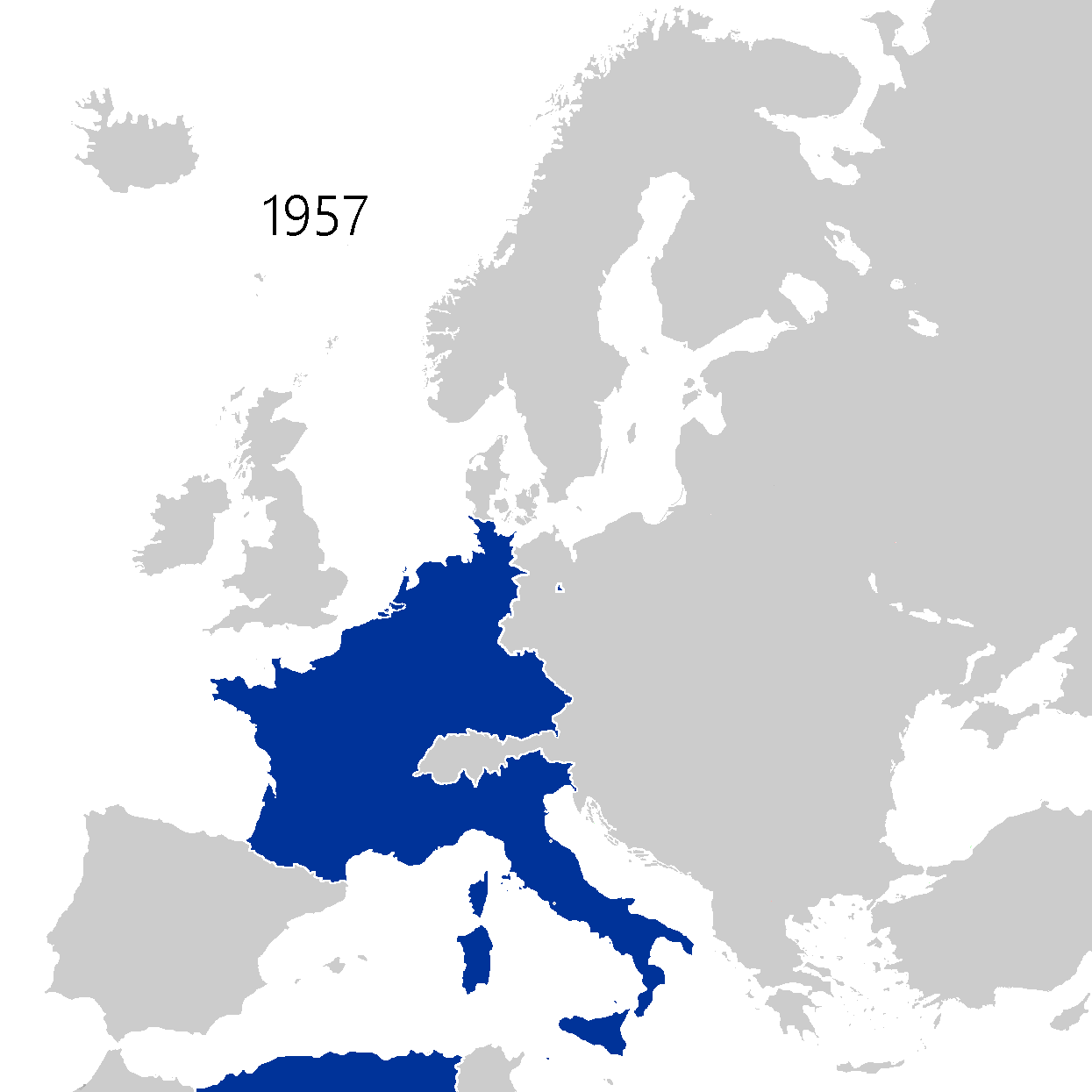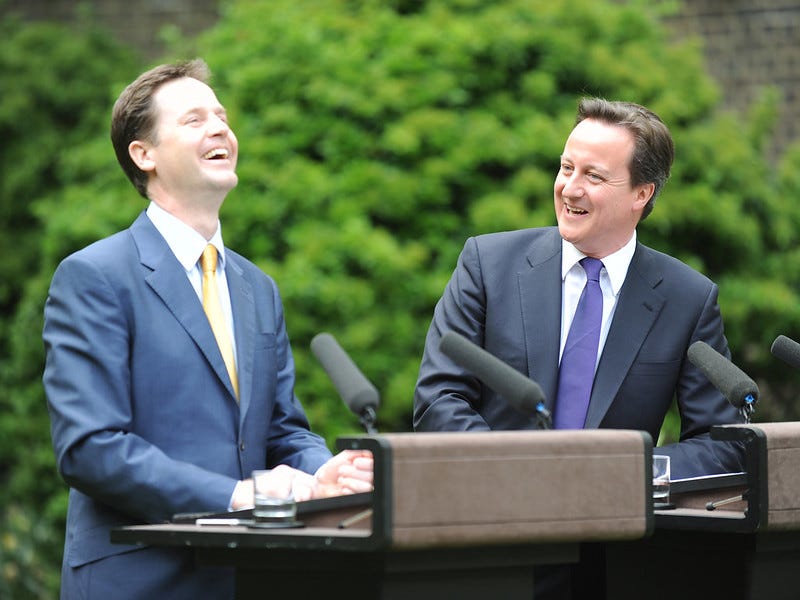The EU is not a bloc
By any reasonable definition and whether people like it or not, the EU is a confederation. Describing it as a bloc misleads the public into thinking it is something far less important.
British newspaper The Guardian last week launched a dedicated Europe section. It’s great news for an underserved market, though again it is dismaying that these media endeavours are only coming from the US and UK, two countries which are outside of the EU and often have fundamental misunderstandings about what the union is. With that in mind, a fellow Brussels journalist reacted with disappointment when he saw that already in the first week they’ve committed the cardinal sin of referring to the EU as a ‘bloc’ in a headline.
This is a big pet peeve for many people in Brussels, including former Commission President Jean-Claude Juncker who said it’s an inaccurate way to describe the EU. For years as a journalist I had gone along with the widespread practice of referring to the EU as ‘the bloc’ on second mention, which is a journalistic term for the replacement word you use to avoid saying the same word twice. It’s why articles often use a country’s capital as a noun to replace the national government, such as “Berlin is opposing” or “Brussels has decreed”. “Joe Biden” would be replaced with “the US president” on second mention, etcetera.
For years I had been using the word ‘bloc’ without stopping to think about its definition and implications. I had heard complaints about its use from people here in Brussels but hadn’t stopped to engage with the subject. But then a few years ago someone saw its use in one of my articles and respectfully pointed out on Twitter what the issue is with its use. It was a good discussion and afterwards I vowed never to use it again. I now use the word ‘union’ on second mention. Unfortunately this is often changed to ‘bloc’ by my editors so I’ve had to proactively ask some to please not insert the word bloc into my text. It might seem like unimportant semantics, but the use of this word causes real confusion for the general public.
Schrödinger’s bloc
What is a bloc? Websters dictionary defines three types: a political bloc, a trade bloc and a voting bloc. While the latter can refer to either people in a legislature or countries/regions in a voting body, the first two would usually just be for countries. The EU could be said to be both of the first two, as Websters puts it in one of its defined meanings: “A group of nations united by treaty or agreement for mutual support or joint action.” Case closed right? Not exactly.
There are some international bodies which are very clearly blocs. The Warsaw Pact was a bloc. NATO is a bloc. NAFTA/USMCA and Mercosur are trade blocs. The African Union is a (very loose) political bloc. But Switzerland is not a bloc. It is a confederation of self-governing cantons with a common foreign policy which we call a country because it is a member of the United Nations. Similarly, the United Arab Emirates would also not be called a bloc. And historically, we do not call the Polish-Lithuanian Commonwealth or the Austro-Hungarian Empire blocs.
Is the European Union a country? The short answer is no, but the long answer is “it’s complicated”. US-based Wendover Productions has done a good job of explaining this complexity in a very easy to follow video. While the EU is not a country and is not defined as such by the United Nations, it has almost all of the characteristics of a country except two very important ones: a common foreign policy and common taxation. “The EU government functions in most ways like any other [national] government,” notes Wendover. It meets all four of the criteria for the Declaratory Theory of Statehood. “But Countries are a social construct - society defines what is a country, and what is not.” Society has not defined the EU as a country, so it isn’t. Even if it meets all the criteria of being one.
However, the question of whether the EU is a confederation is less complex, because a confederation doesn’t need to be a country (although several countries define themselves as confederations). Most academics on the subject define the EU as, at minimum, a confederation. But some, such as international law professor Joseph H. Weiler, Jean-Michel Josselin and Alain Marciano have gone further and said it actually already meets the criteria of being a federation. But the ‘F word’ scares a lot of people here in Europe. So R. Daniel Kelemen, a political science professor at the US university Rutgers, has argued: "Those uncomfortable using the 'F' word in the EU context should feel free to refer to it as a quasi-federal or federal-like system. Nevertheless, the EU has the necessary attributes of a federal system. It is striking that while many scholars of the EU continue to resist analyzing it as a federation, most contemporary students of federalism view the EU as a federal system.”
There is, in other words, nothing else like the EU in the world. How then should the EU be described, given the uniqueness of its situation? The EU is less than a country, but more than a bloc. Even though it meets the common criteria for both, referring to it as either is wrong. By calling the EU a country you are suggesting it is the same thing as the United States, which it isn’t. By calling the EU a bloc you are suggesting it is the same thing as NATO or NAFTA, which it isn’t. Nobody calls the EU a country, but Anglo-American media routinely refer to the EU as a bloc. And that results in public misperceptions.
‘I thought it was a UN for Europe’
Each year I speak to visiting American journalism students from various US universities, who are on a trip organised by the EU to inform them about what the union is. Each year, it is clear that they either have never thought the EU before, or are coming in with deep misperceptions. Three different times, the American students have told me “before this visit I thought the EU was just a mini United Nations for Europe.” They see the coverage of European Council summits, which do very much resemble the UN (that ‘aint a compliment), and think that’s all the EU does. They have no conception that the EU makes laws similar to how their federal government does, that the EU is a single market just like their single American market, or that the EU has a supreme court that safeguards the constitution (treaties) just like they do. That’s because the EU is never portrayed this way in US media. But whether it’s portrayed that way or not, those are all facts. The EU has all of those things.
The use of the word ‘bloc’ is just a very tangible example of the media’s (and here I mean worldwide media, not just Anglo-American) mischaracterisation of the EU since it was created in 1992. I put that in italics because most people don’t understand that this happened. The European Union was created three decades ago out of the former European Community. The EU itself likes to portray this as a simple renaming, for reasons I’ve never understood. I suppose they think that longevity gives the EU more credibility. Or maybe they want to gloss over the reality that national governments quietly pushed through the most transformational change to Europe’s governance since World War II without really informing their citizens about what was happening. The Maastricht Treaty, the foundational constitution of the European Union, turned what had been a very advanced free trade bloc into a confederal union. But somehow, three decades later, people still don’t seem to have gotten the message (despite Toto Cutugno’s best efforts to inform them with his 1990 winning Eurovision song about the upcoming union).
It may have been accurate to call the European Community a bloc. But to call the European Union a bloc does a great disservice to the public by misinforming them about what the EU is. We saw this play out in the 2016 Brexit referendum. The shambolic remain campaign was putting out two contradictory messages. On one hand the EU is essential to Britain’s prosperity and leaving is dangerous. On the other, the EU is just a free market club in which we’re completely sovereign, and those Brexiteers saying the EU controls our laws are lying. Voters rightly questioned, if the EU is just a trade bloc, why would it be so catastrophic to leave it?
This was how the EU had been confusingly portrayed in the British media for two decades. Either it was an out-of-control power-hungry behemoth taking over every aspect of British life, or it was a silly talking shop wasting time and money on dictating the curvature of bananas. The truth, of course, was somewhere in between. But many people in the UK voted to leave the EU on the basis of it being described to them, by their media and politicians (both on the Leave and Remain sides) as a bloc. A club. Nick Clegg even claimed that only 7% of laws in the UK originate from Brussels - a laughable claim. This drastically underplayed what the EU is and how central it had become to Britain’s lawmaking since 1992. Because the EU does control a lot of the laws Europeans are beholden to, by some estimations a majority (62%) comes from Brussels (a proportion similar to that coming from Washington in the US federal-state split).
The leavers are probably right to say there should have been a referendum on the Maastricht Treaty in the UK in 1992. There is merit to their argument that the UK voted to join a free trade bloc and ended up in a political union. But the fact of the matter was that by 2016, 25 years after deciding not to hold a referendum on being part of this bold new experiment, it was arguably too late. It would have been fairly easy for the UK to leave the EU in 1992 (especially if they had joined in an outer EFTA ring with like-minded countries not yet in the EU like Norway, Sweden, Finland, Austria and Switzerland). But as the country has seen, extricating itself from a political union by 2020 is not easy - and the full effects haven’t even been felt yet because the UK is still refusing to apply import tariffs on goods coming from EU countries.
A YouGov poll this summer found that if a referendum on rejoining the EU were held today, only 31% of people in the UK would vote to stay out. Why have so many people changed their minds? Probably because the UK has just been given the biggest crash course on how the EU works of any country in the union’s history. And they were starting from a point of almost no knowledge, with their media and politicians telling them this is just a simple bloc, don’t pay it any serious attention. There was, and still is (though less so now), a lot of confusion among the British public about what the EU is - evidenced by “what is the EU?” being the most googled term in the UK the day after the leave vote. The word ‘bloc’ hasn’t helped that situation.
Words have power. When the media routinely uses the same word to describe the EU as it would to describe a group of lawmakers voting the same way in a parliament or a group of countries who have agreed to scrap border tariffs, they are giving citizens a misleading idea of what the EU is. That has consequences.
There’s really a very simple solution, and it’s the one I’ve been using for the past several years: ‘union’. It’s right there in the name. Don’t get me wrong, I’d love to slip ‘the confederation’ into my copy on second mention. I think that word gives the most accurate description to a reader of what the EU is. However I’m also aware that using this word is controversial and it would stand out like a sore thumb, distracting from the actual substance of the article. Union is therefor a compromise; neither descriptive nor misleading. The word’s only other common use is to refer to trade unions, but no one is in danger of mistakenly thinking the EU is one of those. In the UK it is sometimes used to refer to the country, but only in the context of referring to the idea of the UK being a union of four countries (a constitutionally dubious fallacy, but that’s a subject for another time). So in that way it is probably an especially useful descriptor in Britain.
I can’t tell other journalists what words to use. But I can do my part in not perpetuating misperceptions by not using the word myself, and insisting to my editors that they don’t insert it. The word’s use is, more than anything else, a result of laziness. That was the case for me when I used it for so many years without thinking about how misleading it is. There are plenty of more accurate alternatives.






Very enjoyable reading,
however as from the actual Brexit campaign, media, debates and those I know, Brexit vote was from *not* seeing it as a simple bloc
but
to "get back control", of laws money and borders, of trade and immigration etc.
It was *Remainers* who had the bloc like defence, like the 7% of laws argument you mention
But, even then, mainly the alternative "economic disaster to leave" argument –hardly of a simple bloc.
Also Britain did have an early referendum, in 1975, two years after joining.
I don't think people reading "bloc" has anything like the association you infer, I just see it as an alternative word for group there, and no-one ever complains or brings it up, to my knowledge – you are right that "federation" would bring much more associative thought, good and bad!!